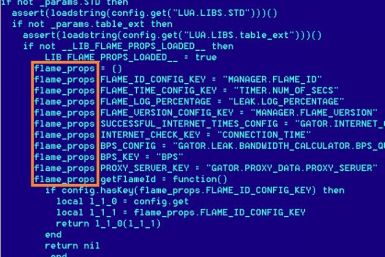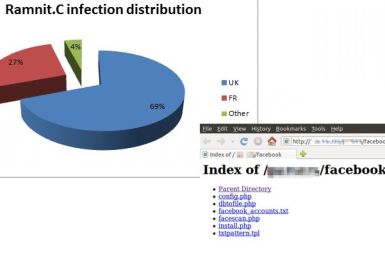New leak alleges U.S. and Israel created Flame virus to hamper Iran's nuclear progress.
Researchers at the Russian security firm Karpersky have discovered a new highly sophisticated malicious program that has been used as a cyber weapon to collect private data from thousands of computers in Middle East countries like Iran and Israel and also in North Africa.
You may not be able to see or hear it, but new research has found that one in five Mac computers carry Windows or Mac Malware.
Internet and network security provider Check Point Software Technologies said it expected to meet second-quarter estimates, after reporting a rise in first-quarter net profit that beat forecasts on strong sales of its new products.
The Flashback Trojan isn't so easy to dismantle, after all. Even though Apple released two software updates and an additional removal tool that was said to eliminate the malware that affected about 600,000 Macs, roughly 140,000 Mac computers are still infected.
As many as 600,000 Macs worldwide have been infested by the sudden attack of Flashback Trojan.
The cybersecurity community raked Apple Inc over the coals on Wednesday, saying the company had dragged its heels on eradicating malware that experts say may have infected up to 600,000 Macintosh computers and can be used to ferret out sensitive user information.
The U.S. House of Representatives will take up a cybersecurity bill at the end of April that lets the government and corporations share information about hacking attacks on U.S. networks, with amendments intended to ease civil liberties concerns, lawmakers said on Tuesday.
Over 600,000 Apple Mac computers running on OS X have been infected with a flashback Trojan virus called BackDoor.Flashback.39. But how can you tell if your Mac has been infected with the Flashback Trojan virus? Here is a guide for how to determine if you have the virus along with removal instructions.
With the help of programmers worldwide, Kaspersky researchers were finally able to identify the Duqu Trojan's mystery code. Part of the malware was created with a little used programming language, which prompts researchers to believe it may have been written by experienced, old-school programmers. The Duqu Trojan is an espionage tool that drew lots of attention last year because it has many Stuxnet-like features.
Philips Electronics said on Thursday it is cooperating with the police in connection with an investigation into a possible criminal cyber security breach discovered at Philips earlier this month.
OS X Mountain Lion has extended the functionality of its predecessor viz. Mac OS X Lion by adding over 100 new features to it. Gatekeeper is one of those news features and it provides a whole new security mechanism for Mac users.
Republican critics of a Senate cybersecurity bill want to slow down consideration of the measure, saying it could give government too much power over private-sector infrastructure companies.
Google Inc has been quietly policing its online store for months now in an acknowledgement of malware's growing threat to its increasingly popular Android mobile software.
Nearly five million Android users will be targeted by a new malware attack.
A computer worm has stolen more than 45,000 Facebook login credentials, leaving users wonder how they can protect their accounts and personal info from future cyber attacks.
Login credentials of 45,000 Facebook users have been leaked out worldwide by the Ramnit malignant code which has invaded the world's No. 1 social network service. The biggest victims were users from the UK and France. The intrusion and theft were discovered by 'Seculert', a cyber threat management service.
A computer worm dubbed Ramnit is believed to have stolen about 45,000 Facebook login credentials, a digital security firm has warned. The stolen data have been taken largely from Facebook accounts in UK and France, the security firm Seculert said.
The Stuxnet virus that last year damaged Iran's nuclear program was likely one of at least five cyber weapons developed on a single platform whose roots trace back to 2007, according to new research from Russian computer security firm Kaspersky Lab.
More than $1 million was stolen from Android Users in 2011 and researchers believe that they are now 4 percent more likely to encounter malware.
More than 100,000 .XXX domains will go live at 11 a.m. Tuesday, possibly ushering in a new era for adult content.
Britain will try to bolster defenses against cyber attack by encouraging companies to overcome their reluctance to admit computer security breaches and share their experiences with each other, the government said on Friday.





























